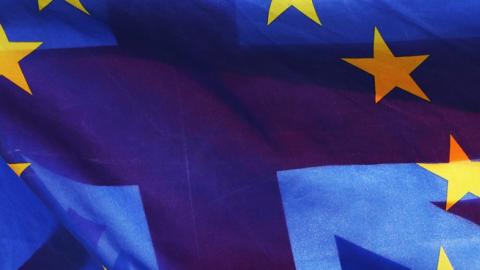With less than 90 days left until the United Kingdom is set to leave the EU, Prime Minister Boris Johnson has staked his new premiership on a “do or die” Brexit by October 31. Foreign Secretary Dominic Raab and Trade Secretary Liz Truss are crisscrossing North America as part of Downing Street’s latest push to shore up economic and political ties with key allies ahead of the looming withdrawal deadline. The United States will play a particularly important role for post-Brexit Britain regarding everything from trade to defense relations. Thus, London’s latest overtures to Washington are hugely significant for ensuring an orderly Brexit — deal or no deal.
Despite the importance of presidential–prime ministerial ties for the strength of Anglo–American relations, Congress remains the crucial player when it comes to any sort of free-trade agreement. Article I, Section 8 of the U.S. Constitution gives Congress the ability to regulate commerce with foreign countries, and both chambers of Congress must approve any trade agreement that the president has introduced.
Like much in Washington today, Congress remains divided on the possibility of a U.S.–U.K. free-trade deal, particularly over the question of Northern Ireland. Other concerns remain, including agricultural exports (such as the infamous chlorinated-chicken debate). However, fears over the return of a hard border in Ireland in the event of a no-deal Brexit have risen to prominence in recent weeks. Currently, goods and people can travel seamlessly between the North and the Republic of Ireland. A hard border would in theory result in physical demarcation of the border, and the resulting customs and immigration checks could negatively impact the region’s economy.
The Congressional Friends of Ireland caucus remains a hugely influential presence on Capitol Hill. The lobby’s bipartisan contingent, from Republican Pete King (N.Y.) to Democratic Ways and Means Committee chairman Richard Neal (Mass.) and Speaker Nancy Pelosi (Calif.), have all made it clear that the House will reject any proposed U.S.–U.K. agreement that potentially jeopardizes the landmark Northern Irish peace settlement, the Good Friday Agreement (GFA), to which the U.S. is a party. Pelosi reiterated these concerns during an April visit to the Irish border and during a “reportedly stormy” meeting with pro-Brexit MPs in London.
In contrast to the House’s approach, Senator Tom Cotton (R., Ark.) and 44 other Republican senators recently penned a letter to the prime minister, voicing their commitment to intelligence sharing and trade relations, as well as “continued, unwavering support for the special relationship between our two countries as Britain leaves the European Union.”
The Irish border debate has similarly become a thorny issue for Britain. Theresa May’s government was unable three times to pass her EU Withdrawal Agreement over the objection of Brexiteer and Northern Irish MPs because of its provisions regarding the Irish backstop, which would lock Britain into a potentially indefinite relationship with the EU in order to maintain frictionless trade between Ireland and Northern Ireland/Britain. Significantly, the Northern Irish Democratic Unionist Party’s 10 MPs are the only way Boris Johnson can command a razor-thin one-seat majority in the House of Commons.
Regardless of whether Britain leaves the EU, and with or without a deal, peace across the island of Ireland and ongoing enforcement of the GFA remain essential. The PM recently made clear that in the event of a no-deal Brexit, Britain will not enforce a hard border, border checks, or physical barriers; furthermore, he reiterated Britain’s commitment to the Union and the GFA, as well as a restoration of the devolved assembly in Belfast. The separatist Sinn Féin party, predictably, has called for a referendum on Irish reunification in the event of a no-deal Brexit, but no serious official thinks that no-deal could return Northern Ireland to The Troubles, the sectarian strife that plagued the region until the adoption of the GFA in 1998.
Unfortunately, Ireland and the EU have used the border question as a cudgel against London, insisting the backstop must stay in any withdrawal deal, and have used the specter of The Troubles to raise doubts even in Washington. Nevertheless, public support in Ireland for PM Leo Varadkar’s hardline Brexit stance has dropped dramatically, and senior officials in Dublin are similarly beginning to question his approach. Given this growing dissatisfaction and Ireland’s heavy economic ties to the U.K., the negative impact of a no-deal Brexit could force Varadkar and the EU’s hands over the backstop.
Ultimately, both Britain and the U.S. can take steps to allay some of the concerns over Northern Ireland and its role in trade negotiations. First, Britain’s new ambassador in Washington will have the ability to restructure the embassy’s operations in the U.S. The Irish embassy has been extremely influential on Capitol Hill, and the British should emulate Ireland’s impressive congressional engagement efforts to build enduring personal relationships with key members on the various armed-services, foreign-affairs, and trade-related committees. Along with frequent engagement by high-level British officials during visits to Washington, the embassy’s regular efforts to keep U.S. policymakers informed of goings-on in London could help reassure weary members of the U.K.’s commitment to the GFA and bolster Anglo–American legislative ties.
Second, since his appointment in 2017, U.S. ambassador to Great Britain Woody Johnson has been a strong advocate of U.S. interests in government circles across London and rural areas alike. The new British ambassador should take advantage of his/her new role and promote British interests across the U.S. Diplomacy should be more than just a heavy presence in Washington and New York. Frequent engagement across the country, from Phoenix to Philadelphia, can remind everyday Americans and government alike of Britain’s commitment to every facet of the special relationship.
Lastly, the position of U.S. special envoy for Northern Ireland remains vacant. Leo Varadkar has already urged the president to make such an appointment, and an American presence in Belfast would be an important way to demonstrate the U.S’s ongoing commitment to the peace process as well as U.S.–Irish and U.S.–U.K. ties, regardless of the final outcome of Brexit.
Peace in Northern Ireland will remain essential after Britain leaves the EU. Boris Johnson’s government has reaffirmed its commitment to defending the Union and upholding the Good Friday Agreement. American policymakers should not fear instability in Ireland, but instead welcome the chance to craft a trade deal and strengthen both the trans-Atlantic economy and our ties with our most important ally.















